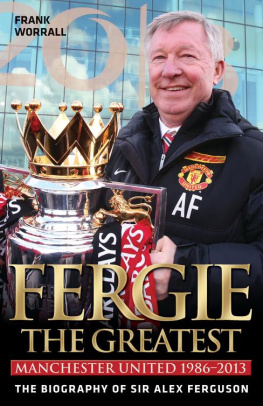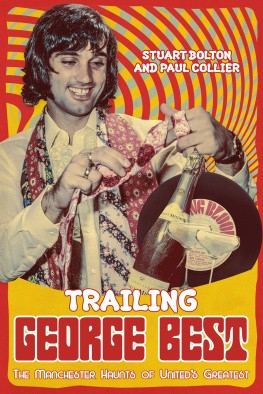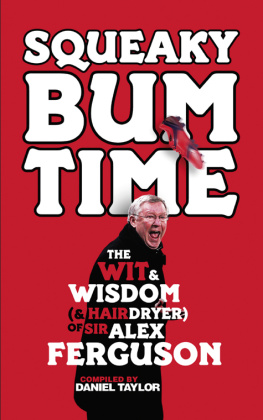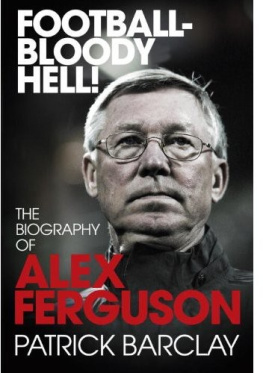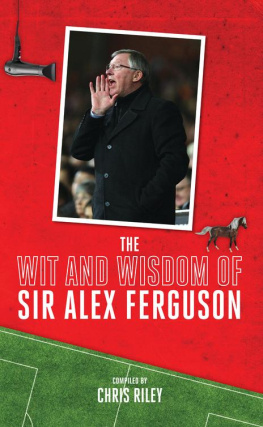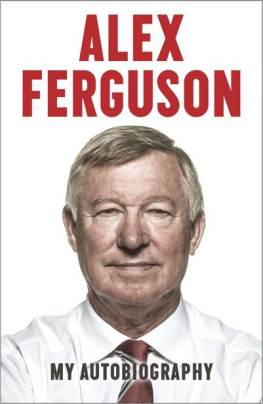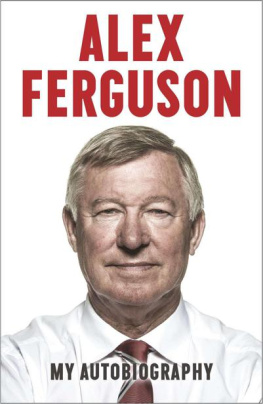First published by Pitch Publishing, 2020
Pitch Publishing
A2 Yeoman Gate
Yeoman Way
Worthing
Sussex
BN13 3QZ
www.pitchpublishing.co.uk
2020, John Silk
Every effort has been made to trace the copyright. Any oversight will be rectified in future editions at the earliest opportunity by the publisher.
All rights reserved. No part of this book may be reproduced, sold or utilised in any form or transmitted in any form or by any means, electronic or mechanical, including photocopying, recording or by any information storage and retrieval system, without prior permission in writing from the Publisher.
A CIP catalogue record is available for this book from the British Library.
ISBN 978 1 78531 685 2
eBook ISBN 978 1 78531 811 5
Typesetting and origination by Pitch Publishing
Printed and bound by TJ International, Padstow, UK
Contents
I am not kidding. This isnt just a job to me. Its a mission. I am deadly serious about it some people would reckon too serious we will get there. Believe me. And when it happens life will change for Liverpool and everybody else dramatically.
Alex Ferguson, 1988
Dedication
I WOULD like to recognise the kindness of my stepmother, who had a big influence on my upbringing. None more so than in harnessing my passion for football, and for Manchester United in particular. Sadly she is no longer with us, but her generosity and interest in my hobbies as a child sparked an enthusiasm for the game and the club she encouraged me to support. The influence she had on me that day when she saw me pretending to play football without a ball in the garden would prove to be far more significant than I could ever have possibly imagined. Her intentional mispronunciation of my childhood favourite player, Jesper Olsen, to tease me, along with her generosity and thoughtfulness in buying me football stickers or the latest replica shirt, are just some of the fond memories I have of her.
Acknowledgements
THE IDEA of this book had been rattling around my head for quite some time, possibly as far back as 2002, though I didnt realise then that an e-mail conversation between friends would eventually turn into 80,000 words almost two decades later.
I always thought the theme was interesting, one that would appeal to fellow Manchester United supporters, and even fans of other clubs. Thankfully, the people at Pitch Publishing thought the same so I am grateful for their assistance. Without Jane and Paul Camillin, Alex Daley, Gareth Davis, Graham Hales, Duncan Olner and Dean Rockett, this book would not have got off the ground.
Huge thanks need to go to a number of authors, journalists and fanzine producers. Without the following, this project would not have been possible Wayne Barton, Ryan Benson, Barney Chilton, Richard Connor, Michael Crick, Daniel Harris, James Mariner and Jim White. They gave up significant chunks of their time, tolerated my e-mails and phone calls during the editorial process, and provided me with excellent feedback.
Interviews with Sir Alex Fergusons biographer, Paul Hayward, and ITV commentator Clive Tyldesley, gave me an invaluable insight into the workings of the former Manchester United manager. I appreciated their time, particularly in light of the fact they had never even heard of me before I got in touch.
Assisting me with contacts, helping with translations, fact-checking historical occurrences and simply offering advice that I sought, were all vital ingredients in bringing this project together. Therefore, there are special mentions for Michael Cox, Anna Dittrich, Roger Hannah, Simon Hart, Fatema Imani, Jamie Jubon, Nik Martin, Iain McCartney, Mark Ogden, Lewis Sanders IV, Emre Sargl, Rob Smyth and Alistair Walsh.
In addition, interviews with two of Fergusons former henchmen Archie Knox and Ren Meulensteen gave me a priceless insight into how the club was run and how crucial decisions were made, particularly in the wake of a defeat. Their contributions enriched this book immensely. When he agreed to write the foreword for this book, Ren gave me the best news since Manchester United won the Premier League title in 2013.
I would like to express my gratitude towards former players John Curtis and Ben Thornley, who both gave up their time to talk about what it was like playing under Ferguson.
Nods also need to go to Bernhard Buntru, Rina Goldenberg and Dean Stewart. All three, inadvertently, helped me get this project up and running.
It would be remiss of me not to mention the central character of this account. As a fan of Manchester United for almost 40 years, Sir Alex Ferguson has provided me with some of the best memories of my life. For that, I will always be truly thankful.
Foreword by Ren Meulensteen
HAVING SPOKEN with John at length about my time at Manchester United, and what it was like to work alongside Sir Alex Ferguson, his knowledge and passion for the club shone through.
As a result, anyone who reads this book will enjoy reliving the amazing journey of Sir Alexs time at the club, especially as this account offers some excellent insights.
I also found the topic particularly intriguing. The boss mentioned in his retirement speech on the pitch at Old Trafford, Even the defeats are all part of this great football club of ours.
His response to losing, both in the way he was with opposing managers and how he galvanised the team and staff around him, was a vital component in the make-up of British footballs most successful manager.
I worked at close quarters with Sir Alex over several years and his reaction to a defeat comprised of three phases.
Firstly, there was the moment, directly after the defeat, when everybody got back in the dressing room. He always had some final comments. It could be something like, We played really well, you didnt get what you deserved. Highlighting the good things with words of encouragement. No problem. Then there were other moments when he felt the team didnt meet the expectations, and he always had the highest of expectations he could be very fierce. He would say forcefully, That wasnt right, this wasnt good enough, you need to step up so that everybody got the message. And that was always immediately after the game, and would last three to five minutes, no more.
The second phase would begin with a moment where he always had a little bit of time for himself before he would confront the media. In that moment, with the press, I always felt he was in control, very collected, very measured, in the way he spoke about the result. Sometimes, after addressing the media, especially at home games, he would come into the dressing room and sit quietly by himself. Players and staff could see a defeat hurt him in this moment. They noticed how it really got to him.
But then, afterwards, there would be the third phase where he would always invite an opposing manager to his office for a glass of wine. I found that a remarkable quality of his. By then, that defeat was gone. He was back to his normal self. He wouldnt get into a strop or a mood, he would communicate normally with jokes and would be very accommodating for the opposing manager. Everything was really good. It was a great experience for me. Its an enormous quality to have, to walk tall with defeat, especially when you are winning so often, to remain humble if you do have a stumble.


